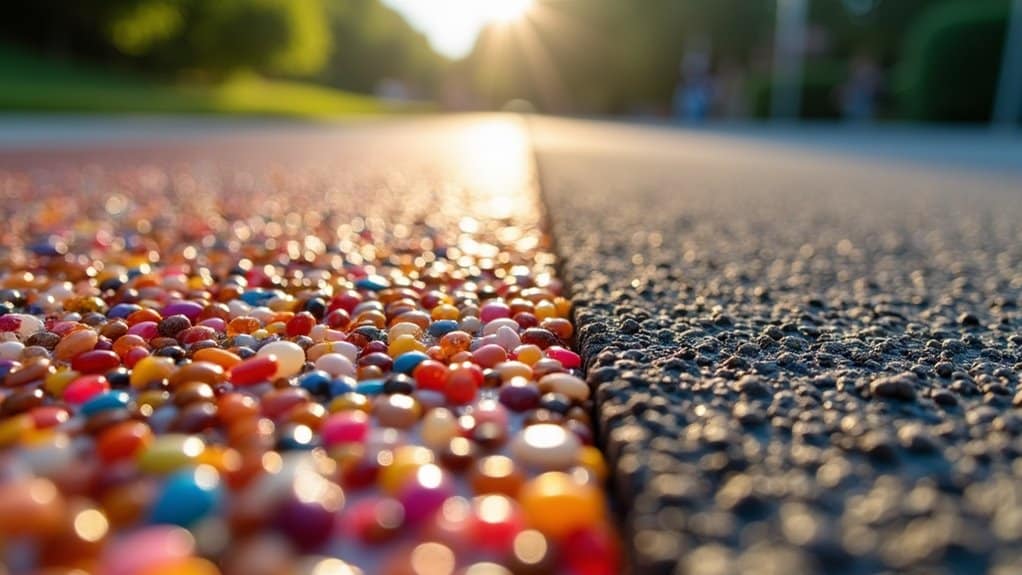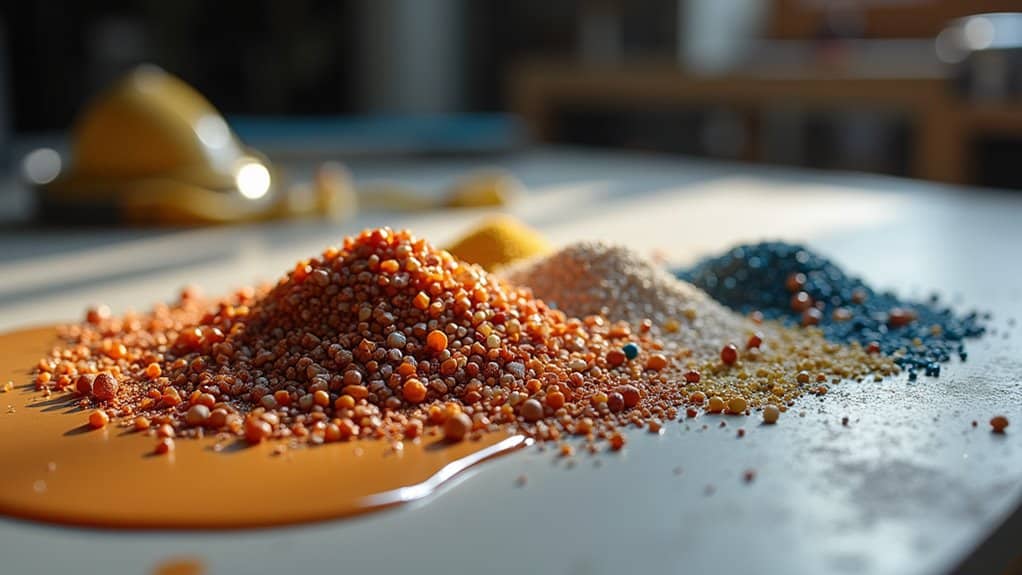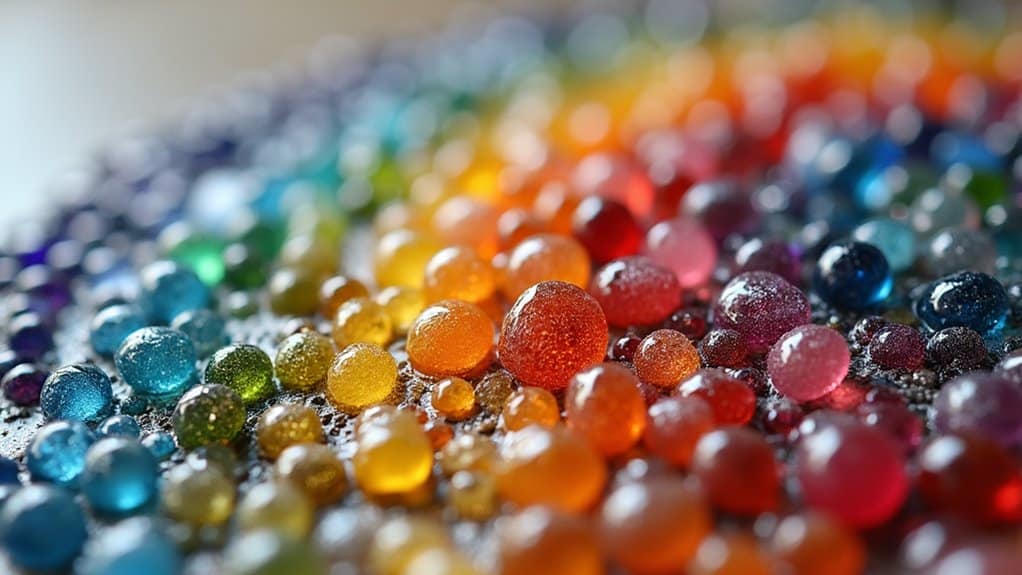Resin bound surfaces combine carefully selected stones with high-grade resins, creating tough, smart-looking driveways and paths. The mix typically features larger stones (2-5mm) alongside finer gravels (1-3mm), bound together with quality polyurethane resin for durability and UV protection.
A key advantage is excellent drainage – rainwater flows straight through rather than pooling on top, making these surfaces ideal for British weather. With proper installation, they'll last over 20 years and need little upkeep beyond occasional brushing and cleaning.
Think of it like a sturdy, permeable carpet of stone – practical for everyday use whilst looking far smarter than standard gravel or concrete. Whilst the initial cost might be higher than traditional materials, the long-term value and low maintenance make it a sound investment for UK homeowners.
The finish can be customised to complement any property, from contemporary flats to period homes, though careful installation by qualified professionals is essential for best results.
Key Takeaways
Resin bound surfaces blend 75% larger stones with 25% smaller stones and resin to create tough, smart-looking outdoor areas perfect for British weather.
Polyurethane-based resins work best in our climate, offering excellent durability against rain and temperature changes – think of it as a protective coat that flexes rather than cracks.
The surface lets rainwater drain straight through, which means no more puddles on your driveway or garden paths, whilst keeping a smooth, polished look.
You can choose from loads of colours and textures – from classic Cotswold stone effects to modern slate finishes – to match your property's style.
At over 20 years' lifespan and needing just basic cleaning, these surfaces prove good value for money compared to traditional paving or concrete. A quick sweep and occasional power wash keeps them looking fresh.
Overview of Resin Bound Materials
Resin bound surfaces combine aggregates with resin to create tough, attractive outdoor surfaces across the UK. Getting the right mix of aggregates is crucial – most installers use kiln-dried gravel or stone in specific ratios, such as 75% larger stones (2-5mm) with 25% smaller ones (1-3mm). A touch of coarse sand or crushed glass (around 5%) can give better grip without affecting strength.
These surfaces truly shine in British weather. They handle foot traffic brilliantly and cope well with our varied climate, resisting the cracking and wear that often plague traditional paving. The UV-resistant resin keeps its colour nicely, even during those rare sunny spells we get. Moreover, their exceptional durability ensures they withstand heavy foot traffic and extreme weather conditions, making them a solid choice for various applications.
A major advantage in our rainy climate is how well these surfaces drain water – they're properly permeable, which helps prevent puddles and flooding. The non-slip finish makes them particularly good for busy areas like driveways and paths, providing a safe surface during wet conditions.
Whether for garden paths, driveways, or patios, resin bound surfaces offer a practical, good-looking solution that's built to last, especially given their long-term value derived from low maintenance and extended durability.
Understanding Resin Types
Different resin types are crucial for resin bound systems, with each offering distinct benefits and uses. The two main categories are thermosetting and thermoplastic resins.
Thermosetting resins – including polyurethane, polyesters and epoxies – create strong, stable materials when mixed with hardeners. Think of it like baking a cake: once it's set, you can't reverse the process. These resins are particularly good for driveways and pathways due to their excellent heat and chemical resistance. Additionally, thermosetting resins cure into inert, strong, solid plastic that maintains stability even under varying conditions. The longevity of these resins contributes significantly to durability and performance in various applications.
Thermoplastic resins work differently, requiring heat and pressure to form. Much like a plastic bottle, they can be remelted and reshaped, but this makes them less reliable for resin bound systems where stability is key.
Polyurethane is the top choice for most UK resin bound projects. It's tough, flexible and holds up well against our variable weather. There are two main types: aromatic (suitable for indoor use) and aliphatic (better for outdoor areas as it resists UV damage).
Choosing the right resin is vital for a lasting installation. For example, a busy car park needs the durability of thermosetting resin, whilst a garden path might benefit from UV-resistant aliphatic polyurethane.
Comparing Resin Bound and Bonded

Comparing Resin Bound and Bonded
Choosing Between Resin Bound and Bonded Surfaces
When selecting surfacing for your project, understanding the key differences between resin bound and bonded systems will help you make the right choice for your needs.
Three essential differences:
1. Permeability: Resin bound surfaces let rainwater drain through naturally – ideal for British weather and meeting planning requirements.
Resin bonded surfaces don't allow water through, so you'll need extra drainage systems.
2. Finish and Aesthetics**: Resin bound gives you a smooth finish**, perfect for paths and driveways.
Think of it like a neat gravel surface without loose stones.
Resin bonded provides a grippy, textured finish – similar to coarse sandpaper, making it brilliant for steep slopes.
3. Maintenance and Durability: Resin bound surfaces last longer and need less upkeep.
Unlike bonded surfaces, they won't shed stones or need regular sweeping, saving both time and money on maintenance. Additionally, resin surfaces' unique honeycomb structure allows for sideways expansion, preventing common failures and ensuring durability.
Installation Process Explained
Surface preparation is crucial before installing resin bound materials. Start by thoroughly sweeping or pressure washing to remove debris.
Fix any cracks and holes to create a level surface – a solid sub-base ensures your installation lasts. The ground temperature must be above 10°C, and you'll need a dry day to avoid problems with curing. It's also important to ensure proper cleaning to avoid any contamination that could affect adhesion. A recommended practice is to perform jet washing 24 hours prior to installation for ideal cleanliness.
Mix the resin bound material in a forced-action mixer. Stick to your supplier's mixing ratios – typically 3:1 aggregate to resin by weight.
Mix thoroughly until all aggregates are properly coated.
Spread the mixture evenly across your prepared surface, keeping a minimum depth of 15mm. You'll need to work quickly before the mixture starts to cure.
Use a trowel or roller for a smooth finish. Allow 24 hours for the surface to cure completely, though this may vary depending on temperature.
Following these steps carefully will give you a durable, good-looking surface.
Maintenance and Care Tips

Maintaining Resin Bound Surfaces
Regular maintenance keeps your resin bound surface looking great whilst protecting your investment. Three key maintenance tips:
1. Routine Cleaning: Clean with a standard pressure washer or garden hose using lukewarm water. The durability of the surface allows for easy cleaning without compromising its integrity. Regular maintenance, such as seasonal care, helps prevent the buildup of moss and grime.
Give the surface a weekly sweep to clear leaves and prevent moss.
Avoid harsh pressure washing, as this may damage the surface.
2. Stain Removal: Tackle spills like engine oil or petrol straight away to protect the resin.
For stubborn chewing gum, apply freeze spray and carefully scrape off.
Wash away bird lime promptly with water to prevent staining.
3. Damage Prevention: Don't place heavy items directly on the surface – use wooden boards to spread the load when needed.
Never drag heavy objects across the surface, as this risks serious damage.
Benefits of Resin Bound Surfaces
Resin bound surfaces deliver remarkable design flexibility, with countless colour and pattern options to match any space. The seamless finish looks smart on driveways, paths and patios whilst being highly practical for both foot traffic and vehicles. These surfaces need little upkeep – just an occasional sweep and wash – making them a sensible long-term investment for British homes and businesses. Additionally, the permeable nature of resin-bound systems helps manage surface water runoff effectively, contributing to sustainable urban drainage systems. Proper installation ensures a lifespan of over 20 years under suitable conditions, making them a durable and reliable choice.
Aesthetic Versatility
Aesthetic Versatility
Resin bound surfaces offer remarkable design flexibility, making them a standout choice for UK properties. The visual possibilities go far beyond traditional paving options:
1. Diverse Colour Options: Choose from a vast range of colours – from warm Yorkshire stone hues to striking Welsh slate greys – to match your garden's style and create a cohesive look.
2. Texture Variations: The finish can be smooth for a contemporary feel or textured for added grip and character.
Mix different-sized aggregates to create unique patterns that suit your taste and practical needs.
3. Design Flexibility: Shape the material into distinctive patterns or keep it simple and elegant. Tough and Long-Lasting Pathways ensure that your investment in resin bound surfaces is justified by their resilience and durability.
Perfect for both modern city gardens and traditional country homes, resin bound surfaces adapt to any setting whilst maintaining their sophisticated appearance.
Each option allows you to craft outdoor spaces that reflect your style whilst providing lasting durability.
Low Maintenance Requirements
Low Maintenance Requirements
Resin bound surfaces offer minimal upkeep, making them perfect for UK homeowners who want an attractive yet practical outdoor solution.
| Benefit | Description |
|---|---|
| Easy Cleaning | Simply sweep with a standard brush or pressure wash for tougher marks. Surfaces dry quickly, preventing water pooling. |
| Minimal Upkeep | Naturally resistant to stains and oil. No weeds or loose stones to deal with, and repairs are rarely needed. |
| Weather-Proof | UV stable and porous for British weather, allowing natural drainage. Won't crack in frost or extreme temperatures. |
| Cost-Effective | Lasts 20-30 years with eco-friendly materials, offering excellent value whilst maintaining its appearance. |
The straightforward maintenance of resin bound surfaces means less time spent on garden work and more time enjoying your outdoor space. Additionally, the superior durability of resin-bound pavement ensures that it can withstand heavy foot traffic without degrading over time.
Challenges to Consider

Challenges with Resin Bound Surfaces
Several key challenges affect resin bound installations, and it's vital to understand these before starting your project.
Installation Risks:
- British weather poses the biggest threat – rain or temperatures above 25°C can ruin the curing process.
- Poor mixing (like using domestic drills instead of proper paddle mixers) leads to weak spots.
- Skimping on thickness, particularly common on driveways, causes premature wear. Proper installation procedures are crucial to ensure the longevity of the driveway.
Ongoing Issues:
- Repairs are tricky – new patches rarely match the original surface perfectly.
- Winter ice makes surfaces slippery, whilst summer heat can soften the resin.
- Ground movement, common in UK clay soils, often leads to cracking. Additionally, the permeability of resin bound surfaces helps manage stormwater runoff, which can be beneficial in areas prone to flooding water management.
These issues don't make resin bound surfaces a poor choice, but they require proper planning and professional installation.
A well-laid surface from a qualified contractor should last 15-20 years with proper care.
Frequently Asked Questions
How Long Does the Curing Process Take for Resin Bound Materials?
The curing time of resin bound surfaces depends heavily on the British weather. During warmer spells (15°C and above), surfaces typically cure within 6-12 hours. In our cooler climate, particularly during autumn and winter months, curing might take up to 48 hours. Most installations in the UK require 24-36 hours to cure properly before use, roughly the equivalent of a full day and night.
Can Resin Bound Surfaces Be Repaired if Damaged?
Resin bound surfaces can indeed be fixed when damaged. Small areas can be patched, whilst cracks are easily filled with matching resin mixture. Much like fixing a chipped tile or damaged paving stone, repairs are straightforward when done properly. Regular upkeep, such as sweeping and occasional pressure washing, helps prevent major damage and keeps the surface looking fresh for years to come.
What Is the Average Lifespan of Resin Bound Surfaces?
Resin bound surfaces typically last 15-25 years when properly installed and maintained. With quality materials and regular upkeep – much like caring for a garden patio – these surfaces can serve well beyond their expected lifespan. Think of it as similar to a quality driveway: the better you look after it, the longer it lasts.
Are Resin Bound Materials Eco-Friendly?
Resin bound surfaces tick several eco-friendly boxes. They're permeable, meaning rainwater drains naturally into the ground rather than overwhelming storm drains and causing floods. Many suppliers use recycled materials like glass and crushed stone in their aggregate mix, reducing waste. The durability of these surfaces – often lasting 15-20 years with proper care – means less frequent replacement and fewer materials used over time. Whilst the resin itself is synthetic, the system's overall environmental benefits, particularly in managing urban water run-off, make it a practical green choice for UK driveways and paths.
Can Resin Bound Surfaces Be Installed in Cold Weather?
Resin-bound surfaces can be installed during cold weather, but proper precautions are essential. The ideal temperature for installation is above 5°C, much like laying concrete or working with similar materials common in British construction. Whilst installation is possible in colder conditions, extra care must be taken with curing times and moisture levels to ensure a proper bond. Think of it like making a cuppa – you wouldn't use cold water and expect the same results as with hot water.
Conclusion
Resin bound materials combine practical benefits with visual appeal. They prove highly durable and need minimal upkeep, helping maintain their appearance for years. Whilst installation requires careful attention, particularly regarding temperature and moisture levels (much like laying a proper concrete base), the results are worth the effort. Understanding different resin types and proper installation methods is crucial for success. When done correctly, these surfaces provide a reliable, attractive finish suitable for driveways, paths and patios across the UK.
